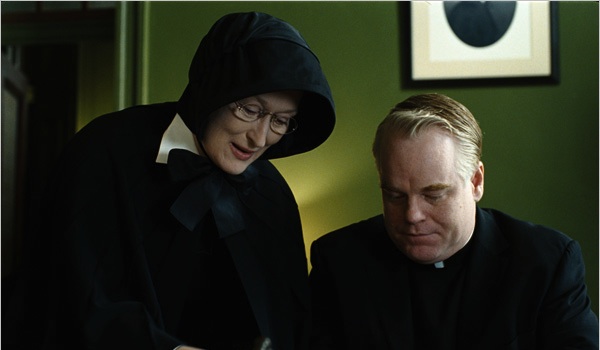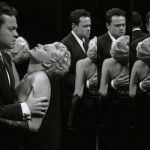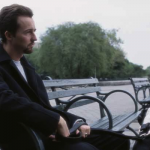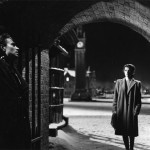Doubt Review
“Doubt†is a film of uncommon depth and intelligence, and it tackles some very interesting philosophical issues. What is certainty? How much doubt is necessary to prevent oneself from doing something hurtful? And what in the world is it going to take to get Meryl Streep another damn Oscar? She seems to top herself year after year, and 2008 was no different. Throw in some more great work from Phillip Seymour Hoffman, Amy Adams, and Viola Davis, and you’ve got one hell of an ensemble—and one hell of a film.
The setting is the St. Nicholas School in the Bronx in the sixties. The school is ruled by two conflicting forces. Father Flynn (Hoffman) is the school’s progressive priest. He wants children and their parents to feel like those at the school are an extension of their family. His rival, Sister Aloysius Beauvier (Streep), is the school’s principal. She rules the place with an iron fist and has little desire to be anything more to these kids than a disciplinarian (at least on the surface).
The film’s story centers around one question: Did Father Flynn have inappropriate contact with the school’s only black student, Donald Muller (Joseph Foster)? The naïve Sister James (Adams) brings her suspicions to Sister Aloysius, who is absolutely convinced of his guilt. The evidence is flimsy, but it does appear as if there’s something about the priest’s relationship to the student that’s off. So the two figures who’ve had nothing but animosity for each other in private bring their battle into the open.
“Doubt’s†biggest asset is its acting, and it all starts with Streep. Her work is frightening but brilliant. She inhabits the habit with the conviction of a woman possessed. Sister Aloysius will stop at nothing to get Father Flynn fired. She wants nothing to do with the man with long fingernails and three lumps of sugar in his tea, and she only needs a sliver of evidence to make her certain. Streep also plays her as someone who truly wants what is best for her school. It’s not as if she’s heartless (the last scene shows this spectacularly). She just really has it out for Flynn.
Hoffman, like Streep, was nominated for an Oscar, and in many ways, he gives an even more impressive performance. The success of the film really hinges on Father Flynn’s ambiguity, and Hoffman sells it spectacularly. And he holds his own with one of cinema’s greatest actresses ever. Not many people could do that.
Two other actresses picked up nominations: Amy Adams and Viola Davis. Adams’ character is the film’s moral compass. She doesn’t have any ulterior motives, she simply wants the truth. And she’s pretty clearly over her head. Adams is great—maybe not as good as her co-stars—but she’s an important cog in the ensemble and doesn’t bring it down at all. Davis plays Donald’s mother. She only appears in one extended scene, but it’s gut-wrenching.
For all the talk about the acting, however, “Doubt†is a lot more than that. Director John Patrick Shanley (who also adapted the film from his own Pulitzer Prize-winning play) fills the film with Dutch-angle shots and other flourishes that let you know things in this world just aren’t quite right. The film’s writing is incredibly sharp. And the ending is surprising and opens up a whole world of possibilities.
“Doubt†is the kind of film I admire more and more every time I see it. I can always revisit the film and its masterful acting and take something new away from it. That’s the mark of a truly great film.















